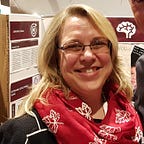K is for Knowledge
What’s the point of teaching knowledge when we have Google? Well, it’s simple, because you don’t know what you don’t know. You need to know something to ask something of Google, right? Furthermore, how do you know you should even be asking something in the first place?
William Poundstone considers this very conundrum in his article Does knowledge matter in the age of Google? He queries why we should “figure out anything for ourselves when everything is so easy to look up?” He even goes so far as to say that it doesn’t in certain cases.
There’s a decent case that it doesn’t. In the 1950s economist Anthony Downs coined the concept of rational ignorance. In many situations, Downs observed, learning isn’t worth the bother. Most of us don’t learn car repair or medicine or accounting. Instead, we consult professionals when such expertise is needed — and that’s perfectly reasonable.
The crux of the matter comes to light though when Poundstone talks about outsourcing our memory and knowledge.
Today, we’re outsourcing memory and knowledge to the internet. This is often a good thing, but it comes with a drawback. The cloud is making us meta-ignorant: unaware of what we don’t know.
As I said earlier, you don’t know what you don’t know.
In addition to the thought that knowledge learning is unnecessary because of the ease with which we can now obtain information, its reputation has been tarnished lately. Oftentimes knowledge takes a beating in favour of creativity and critical thinking, etc. What I wonder is why we think these concepts are in conflict? They are not exclusive, rather, they NEED each other. I like how Ian Bauckham in his blog Why Does Knowledge Matter? explained it:
Firstly, we have too often thought that knowledge is somehow inferior to critical skills or creativity. This notion is reinforced in the minds of so many teachers by the lazy, but ubiquitous, use of Bloom’s taxonomy pyramid in teacher training, where knowledge is at the bottom of the pyramid. Interpreted as meaning that knowledge is of a lower order, rather than foundational, teachers are implicitly encouraged to devote more energies to the supposedly higher order critical and creative skills.
Bauckham’s suggestion that knowledge is foundational is so important to remember. In my English classes, I witness this at work. Many students are readily able to discuss a text in terms of their reaction to it. For example, I liked the character because I could relate to them, the plot was suspenseful and I enjoy the unexpected, etc. But they have a distinct struggle going deeper and analyzing the text — because analyzing requires not only thinking critically but a thorough foundation of knowledge about literary structures, patterns and devices to apply in that critical thinking process.
Dr. Natalie Saaris in The Content Comeback: Why Knowledge Matters to Thinking and Learning outlines significant reasons we shouldn’t ignore knowledge. First, it’s essential to help us understand what we read. Saaris cites Recht and Leslie’s study which showed
content knowledge as a better predictor of a student’s understanding of a text than reading ability; students who are familiar with the relevant content of an article understand it better than do their peers who are presumed better readers.
Second, critical thinking, a necessary skill in today’s world, requires knowledge. Saaris says
the dichotomy between content knowledge and higher-level reasoning skills is misleading: we may think we are privileging deeper learning when we focus on skills rather than content, but the former depends on the latter. We cannot challenge an assumption unless we have evidence that contradicts it. We cannot create connections between ideas unless those ideas are already stored in our memory.
Knowledge is needed to make connections, see patterns, recognize anomalies. Knowledge doesn’t take away time from teaching and practicing critical thinking skills, it enhances them. So next time it feels like knowledge is taking the back-burner because other skills or activities are deemed more important, remember it is not one or the other, it’s all interconnected and necessary.
Originally published at http://wordsgrow.com on July 10, 2019.
